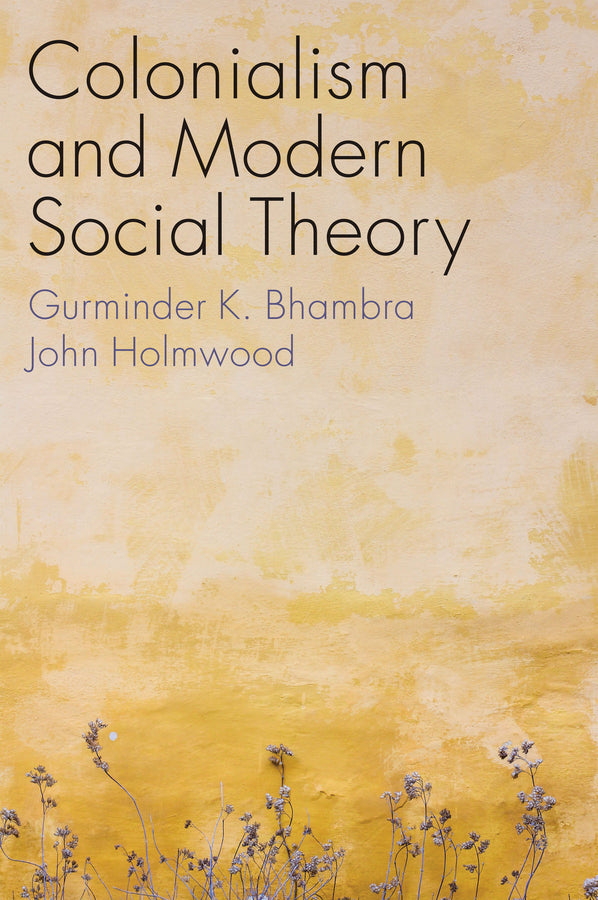Description
Discover the profound connection between colonialism and modern social theory with 'Colonialism and Modern Social Theory'. This essential book examines how European colonialism shaped modern societal structures and social thought, offering a critical perspective that integrates the legacies of empire into the narrative of contemporary social theorizing. Authored by renowned scholars Gurminder K. Bhambra and John Holmwood, this insightful work delves into the contributions of foundational social theorists such as Hobbes, Hegel, Tocqueville, Marx, Weber, Durkheim, and Du Bois, all while critically addressing the notable absence of colonial influences in classical social theory. The authors meticulously unpack the implications of this oversight, paving the way for a reconstructed understanding of social theory that is relevant to today’s complex societal dynamics. With 272 pages of in-depth analysis, this book is invaluable for students, scholars, and anyone interested in the intersections between colonial history and modern social structures. Make your order today and engage with a text that challenges conventional perspectives, enriching your understanding of social theory and its colonial roots. Free shipping is available, with delivery expected within 6 weeks. Note that once your order is placed, it cannot be cancelled. Condition: BRAND NEW, ISBN: 9781509541300, Published by John Wiley & Sons (UK) in 2021.
Note: Shipping for this item is free. Please allow up to 6 weeks for delivery. Once your order is placed, it cannot be cancelled.
Condition: BRAND NEW
ISBN: 9781509541300
Year: 2021
Publisher: John Wiley & Sons (UK)
Pages: 272
Description:
Modern society emerged in the context of European colonialism and empire. So, too, did a distinctively modern social theory, laying the basis for most social theorising ever since. Yet colonialism and empire are absent from the conceptual understandings of modern society, which are organised instead around ideas of nation state and capitalist economy.
Gurminder K. Bhambra and John Holmwood address this absence by examining the role of colonialism in the development of modern society and the legacies it has bequeathed. Beginning with a consideration of the role of colonialism and empire in the formation of social theory from Hobbes to Hegel, the authors go on to focus on the work of Tocqueville, Marx, Weber, Durkheim and Du Bois. As well as unpicking critical omissions and misrepresentations, the chapters discuss the places where colonialism is acknowledged and discussed “ albeit inadequately “ by these founding figures; and we come to see what this fresh rereading has to offer and why it matters. This inspiring and insightful book argues for a reconstruction of social theory that should lead to a better understanding of contemporary social thought, its limitations, and its wider possibilities.
Note: Shipping for this item is free. Please allow up to 6 weeks for delivery. Once your order is placed, it cannot be cancelled.
Condition: BRAND NEW
ISBN: 9781509541300
Year: 2021
Publisher: John Wiley & Sons (UK)
Pages: 272
Description:
Modern society emerged in the context of European colonialism and empire. So, too, did a distinctively modern social theory, laying the basis for most social theorising ever since. Yet colonialism and empire are absent from the conceptual understandings of modern society, which are organised instead around ideas of nation state and capitalist economy.
Gurminder K. Bhambra and John Holmwood address this absence by examining the role of colonialism in the development of modern society and the legacies it has bequeathed. Beginning with a consideration of the role of colonialism and empire in the formation of social theory from Hobbes to Hegel, the authors go on to focus on the work of Tocqueville, Marx, Weber, Durkheim and Du Bois. As well as unpicking critical omissions and misrepresentations, the chapters discuss the places where colonialism is acknowledged and discussed “ albeit inadequately “ by these founding figures; and we come to see what this fresh rereading has to offer and why it matters. This inspiring and insightful book argues for a reconstruction of social theory that should lead to a better understanding of contemporary social thought, its limitations, and its wider possibilities.

